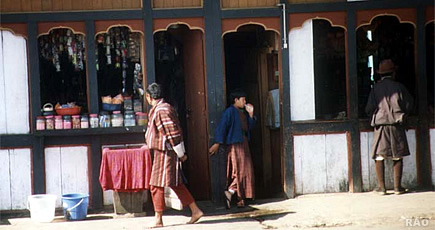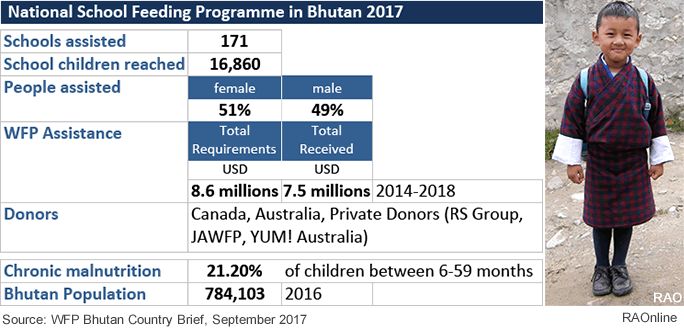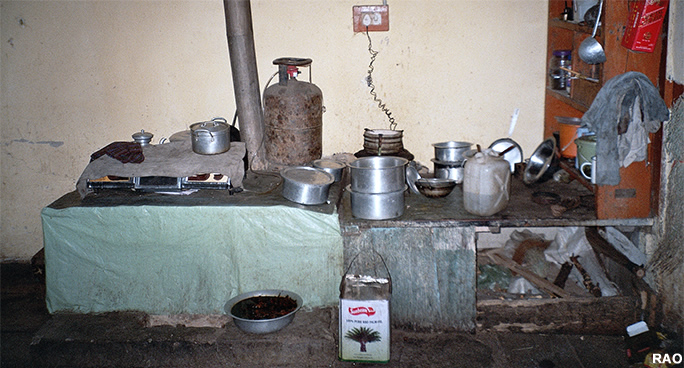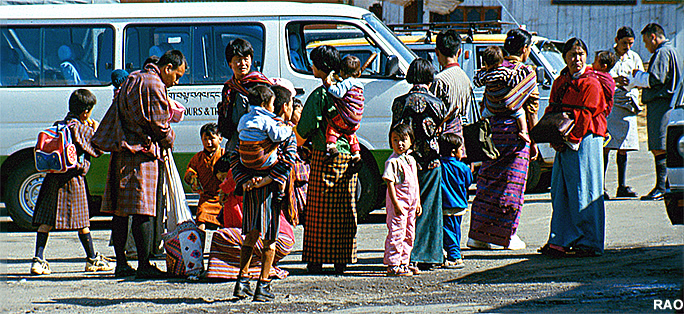 |
Bhutan's Development |
 |
Bhutan Information |
|
|
 |
| World
Food Programme in Bhutan |
 |
|
About
World Food Programme: WFP's Mission Statement
|
 |
WFP is the food aid arm of the United Nations system.
Food aid is one of the many instruments that can help to promote food security,
which is defined as access of all people at all times to the food needed
for an active and healthy life.1 The policies governing
the use of World Food Programme food aid must be oriented towards the objective
of eradicating hunger and poverty. The ultimate objective of food aid should
be the elimination of the need for food aid.
Targeted
interventions are needed to help to improve the lives of the poorest people
- people who, either permanently or during crisis periods, are unable to
produce enough food or do not have the resources to otherwise obtain the
food that they and their households require for active and healthy lives.
| Consistent
with its mandate, which also reflects the principle of universality, WFP
will continue to: |
 |
 use
food aid to support economic and social development; use
food aid to support economic and social development;
 meet refugee and other emergency food needs, and the associated logistics
support; and ... meet refugee and other emergency food needs, and the associated logistics
support; and ...
 promote world food security in accordance with the recommendations of the
United Nations and FAO. promote world food security in accordance with the recommendations of the
United Nations and FAO.
| The
core policies and strategies that govern WFP activities are to provide
food aid: |
 |
 a)
to save lives in refugee and other emergency situations; a)
to save lives in refugee and other emergency situations;
 b)
to improve the nutrition and quality of life of the most vulnerable people
at critical times in their lives; and ... b)
to improve the nutrition and quality of life of the most vulnerable people
at critical times in their lives; and ...
 c)
to help build assets and promote the self-reliance of poor people and communities,
particularly through labour-intensive works programmes. c)
to help build assets and promote the self-reliance of poor people and communities,
particularly through labour-intensive works programmes.
In
the first case, food aid is essential for social and humanitarian protection.
It will be used in a way that is as developmental as possible, consistent
with saving lives. To the extent possible, the provision of relief food
aid will be coordinated with the relief assistance provided by other humanitarian
organizations. In the second case, food aid is a pre-investment in human
resources. In the third, it uses poor people's most abundant resource,
their own labour, to create employment and income and to build the infrastructure
necessary for sustained development.
WFP is well placed to play a major role in the continuum from emergency relief
to development. WFP will give priority to supporting disaster prevention,
preparedness and mitigation and post-disaster rehabilitation activities
as part of development programmes. Conversely, emergency assistance will
be used to the extent possible to serve both relief and development purposes.
In both cases the overall aim is to build self-reliance.
In
carrying out its mandate, WFP will concentrate on what it is best
suited to do with the resources available as cost-effectively as possible. WFP will focus on those aspects of development where food based interventions
are most useful. It will make all necessary efforts to avoid negative effects
on local food production, consumption patterns and dependency on food aid. WFP will continue to play a major and significant role in providing transport
and logistic expertise and assistance to ensure rapid and efficient delivery
of humanitarian aid.
WFP's
multilateral character is one of its greatest strengths. WFP will
exploit its capability to operate virtually everywhere in the developing
world, without regard to the political orientations of governments, and
to provide a neutral conduit for assistance in situations where many donor
countries could not directly provide assistance.
WFP will provide services: advice, good offices, logistic support and information;
and support to countries in establishing and managing their own food assistance
programmes.
WFP,
on request, will provide bilateral services to donors, UN
agencies and NGOs on the basis of full cost recovery. These will
be administered and accounted for separately. Such services will complement WFP's
regular operations to the extent possible.
WFP will concentrate its efforts and resources on the neediest people2 and countries in accordance with the CFA's decision to provide at
least 90 percent of WFP's development assistance to low-income,
food-deficit countries and at least 50 percent of its development assistance
to the least developed countries.
 |
| WFP will ensure that its assistance programmes are designed and implemented
on the basis of broad-based participation. Women in particular are key
to change; providing food to women puts it in the hands of those who
use it for the benefit of the entire household, especially the children. WFP assistance will aim to strengthen their coping ability and resilience. |
|
To
be truly effective, food aid should be fully integrated into the development
plans and priorities of recipient countries and coordinated with other
forms of assistance. WFP's starting point is the national policies,
plans and programmes of developing countries, including their food security
plans. WFP will pull together its activities in an integrated way
at the country level so that it can respond to urgent needs as they occur
while retaining core development objectives. The country strategy note,
where this exists, should provide the framework for an integrated response
by the United Nations system. In some special cases WFP will adopt
a multi-country or regional approach, particularly for the provision of
humanitarian assistance.
 |
No
single agency has either the resources or the capacity to deal with all
the problems of hunger and underdevelopment. Hence the importance WFP attaches to collaboration with other agencies, particularly with its parent
bodies, the United Nations and FAO. WFP will continue to
work closely with the United Nations Office for the Coordination of
Humanitarian Affairs, UNHCR, other relevant agencies and non-governmental
organizations (NGOs) in the response to emergencies and humanitarian crises. WFP will also collaborate closely with the Rome-based United Nations food and
agriculture agencies, FAO and IFAD, especially in using food
aid for achieving household food security. WFP will continue to
forge effective partnerships of action with UNDP, the World Bank and the International Monetary Fund, regional bodies and institutions,
bilateral donors and NGOs in support of economic and social development.
WFP will play its part as an active member of the United Nations system to
bring the issue of hunger to the centre of the international agenda. In
its dialogue with recipient governments and the aid community, WFP will advocate policies, strategies and operations that directly benefit
the poor and hungry.
1
FAO/WHO (1992) International Conference on Nutrition.
2
Normally, poor and hungry people are those who earn less than the equivalent
of one dollar a day, or who allocate the majority of their household budget
to food.
 |
| Source:
World Food Programme WFP 2008 |
top
| WFP's support is gradually being phased out |
 |
WFP supports the Government of Bhutan to become self-reliant in the management, coordination and implementation of a cost-effective, equitable and quality national school feeding programme. The Government of Bhutan has been implementing school feeding for more than four decades, and WFP's support is gradually being phased out. The current development project is facilitating this transition process by transferring knowledge, systems and skills to the relevant government partners.
The residual number of students supported by WFP is gradually reducing with responsibility, and a certain number are being handed over to the Government on an annual basis.
The Ministry of Education, as the lead agency for implementing the National School Feeding Programme, has started providing fortified rice in the school meals. By the start of the 2019 school year, the responsibility for all schoolchildren will be covered by the Government.
The project has two primary objectives aimed at phasing out WFP support to school feeding by the end of 2018:
(i) to strengthen the capacity of the Ministry of Education to be an effective steward of a nationwide school feeding programme; and
(ii) to maintain access to and gender parity in primary education that contributes to enhanced learning.
In line with these objectives, WFP pursues two interrelated strategies: firstly, to continue supporting primary schools in remote areas, gradually handing over this responsibility to the Ministry of Education, and secondly to strengthen the capacity of the Ministry to set policy and priorities, manage the supply chain and oversee programmes so that it can independently administer the nationwide school feeding programme.
WFP has been present in Bhutan since 1974.
 |
| Source:
WFP Bhutan Country Brief, September 2017 |
top
| Information on Bhutan |
 |
| Links |
 |
 |
 |
Externe Links |
|



![]() use
food aid to support economic and social development;
use
food aid to support economic and social development;
![]() meet refugee and other emergency food needs, and the associated logistics
support; and ...
meet refugee and other emergency food needs, and the associated logistics
support; and ...
![]() promote world food security in accordance with the recommendations of the
United Nations and FAO.
promote world food security in accordance with the recommendations of the
United Nations and FAO.
![]() a)
to save lives in refugee and other emergency situations;
a)
to save lives in refugee and other emergency situations;
![]() b)
to improve the nutrition and quality of life of the most vulnerable people
at critical times in their lives; and ...
b)
to improve the nutrition and quality of life of the most vulnerable people
at critical times in their lives; and ...
![]() c)
to help build assets and promote the self-reliance of poor people and communities,
particularly through labour-intensive works programmes.
c)
to help build assets and promote the self-reliance of poor people and communities,
particularly through labour-intensive works programmes.






